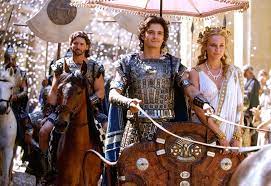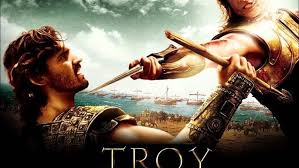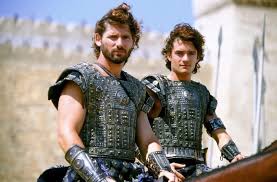🎬 Troy (2004)
- thaiduong
- January 7, 2025

🎬 Troy (2004)
Director: Wolfgang Petersen
Genre: Epic Historical Drama, Action
Screenplay: David Benioff
Based On: The Iliad by Homer (and other Greek myths)
Cast: Brad Pitt, Eric Bana, Orlando Bloom, Diane Kruger, Peter O’Toole, Sean Bean, Brian Cox, Rose Byrne
Plot Summary
Troy is a sweeping epic that brings Homer’s Iliad to life, chronicling the legendary Trojan War and the clash of two great civilizations: the Greeks and the Trojans. Blending action, drama, and tragedy, the film explores themes of honor, love, and the consequences of ambition.
Act I: The Seeds of War
Set in 1250 B.C., the film begins with the fragile peace between the Greek city-states and the kingdom of Troy. This peace is shattered when Paris (Orlando Bloom), a Trojan prince, falls in love with Helen (Diane Kruger), the queen of Sparta, and takes her back to Troy.
Enraged by this betrayal, Helen’s husband, King Menelaus (Brendan Gleeson), seeks revenge and enlists his brother, Agamemnon (Brian Cox), to lead a united Greek army against Troy. Agamemnon, a power-hungry king, seizes the opportunity to expand his empire.
The Greeks summon their greatest warrior, Achilles (Brad Pitt), a near-invincible fighter who is both a hero and a reluctant participant in the war. Achilles is driven more by the pursuit of eternal glory than loyalty to Agamemnon.
Act II: The Siege of Troy
The Greeks land on Trojan shores and begin their siege. Achilles leads a devastating assault, capturing Troy’s beachhead and sacking the temple of Apollo. In the temple, Achilles meets Briseis (Rose Byrne), a Trojan priestess and cousin of King Priam (Peter O’Toole). Their relationship develops into a complex bond that challenges Achilles’ view of the war.
Meanwhile, Hector (Eric Bana), the noble prince of Troy and Paris’s elder brother, takes charge of defending the city. A fierce warrior and loving family man, Hector embodies honor and responsibility, contrasting Achilles’ pursuit of individual glory.
The war escalates as personal rivalries and tragic events unfold. In a brutal duel, Hector kills Patroclus, Achilles’ beloved cousin, who had donned Achilles’ armor to rally the Greeks. Consumed by grief and rage, Achilles vows revenge.
Act III: The Tragic Climax
Achilles and Hector face off in a climactic duel outside the walls of Troy. The battle is fierce, and Hector falls to Achilles, who desecrates his body by dragging it behind his chariot. This act deepens the hatred between the two sides.
King Priam, in a moment of profound humility, sneaks into the Greek camp to beg Achilles for Hector’s body. Moved by Priam’s grief, Achilles relents, showing a rare glimpse of humanity.
The Greeks then deploy their cunning plan: the Trojan Horse. Feigning retreat, they leave a massive wooden horse as a “gift.” The Trojans bring the horse into their city, unaware that it hides Greek soldiers.
That night, the Greeks emerge from the horse, open the city gates, and launch a devastating attack. Troy burns as the Greeks slaughter its people. Achilles, however, meets his fate when Paris shoots him with an arrow to avenge his brother.
The film concludes with Troy in ruins, Helen and Paris escaping, and Aeneas, a Trojan survivor, carrying the seeds of a new legacy.
Themes and Analysis
- Honor and Glory
The film explores the tension between personal glory (Achilles) and collective responsibility (Hector). It questions the cost of honor and the legacy of warriors. - Love and Betrayal
Paris and Helen’s romance serves as the catalyst for war, highlighting how personal choices can have monumental consequences. - The Futility of War
Troy portrays the destruction and loss wrought by war, emphasizing its cyclical nature and the human cost of ambition and vengeance. - Mortality and Legacy
Achilles’ obsession with eternal glory reflects humanity’s desire for immortality through deeds, even as the film underscores the fleeting nature of life.
Performances
- Brad Pitt: Embodies Achilles with a mix of ferocity, arrogance, and vulnerability, capturing the complexity of the legendary warrior.
- Eric Bana: Shines as Hector, portraying him as a noble and honorable figure, providing an emotional anchor to the story.
- Orlando Bloom: Portrays Paris as impulsive and romantic, serving as the catalyst for the war.
- Peter O’Toole: Delivers a poignant performance as Priam, exuding wisdom and heartbreak.
- Diane Kruger: As Helen, she represents both beauty and the burden of being an object of desire.
Visual Style and Direction
Wolfgang Petersen’s direction brings grandeur and intensity to the screen. The large-scale battles are meticulously choreographed, blending practical effects with CGI to create epic visuals. The Trojan Horse sequence is particularly iconic, showcasing the ingenuity and betrayal central to the story.
The film’s cinematography emphasizes the scale and brutality of war, while the score by James Horner captures both the heroism and tragedy of the narrative.
Reception and Legacy
Troy received mixed reviews upon release, with praise for its performances, action sequences, and production design but criticism for deviations from its source material. Despite this, it became a commercial success, grossing over $497 million worldwide.
Over time, Troy has gained appreciation as a visually stunning and emotionally engaging epic, cementing its place in the pantheon of historical dramas.
Conclusion
Troy is a visually spectacular and emotionally resonant retelling of one of the most enduring tales in human history. It captures the grandeur of ancient myth while delving into the personal struggles of its characters, offering a timeless exploration of love, honor, and the cost of ambition.